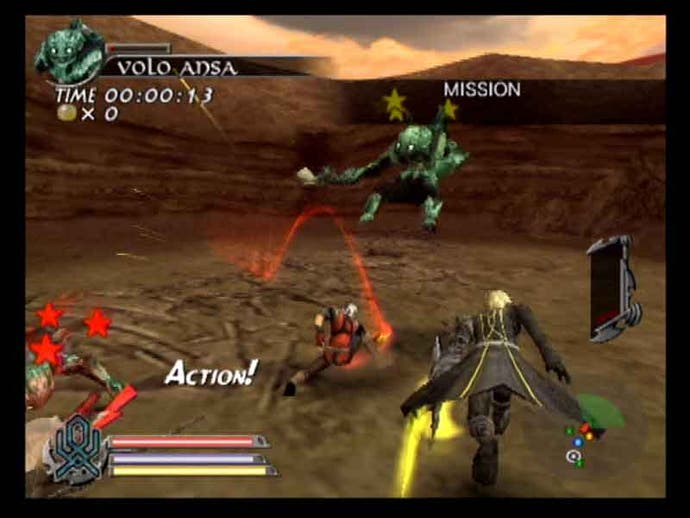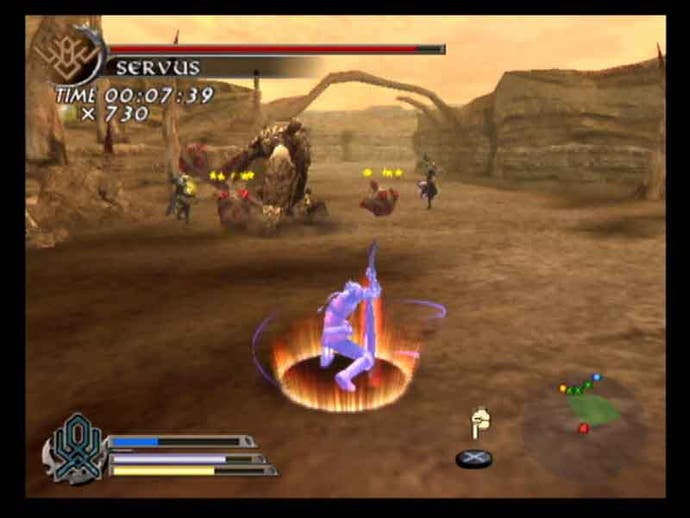Sword of Etheria
Nice game in Etheria.
There's no 'You' or 'I' in 'Unit'. No, hang on, that's not right. There's... Look, I've never been much cop at these prep talks. Or group sports. Or Big Team Battle. Or anything involving teamwork in general really. Set me up as a sniper covering your back in Ghost Recon on Xbox Live and you'll be licking asphalt before I put down the beer, finish the Maltesers and catch LisaSimpson45 victoriously humping your limp wireframe model in my distracted scope. Remember last week when that bloke spouted all that nonsense about single-player games being masturbatory? Well colour me blind and count me calloused: I like it that way. In real life, sure, come round my house, borrow my sugar, take my coffee; let me get that door for you. In-game: piss off and leave me alone. I'm Rambo. I'm The Punisher. I'm the Lone-freakin'-Ranger.
OK: technically I'm just a closet geek that should probably chase some more sunlight but still: I don't work with nobody. So it's a bit of a problem for me when a single-player game like Sword of Etheria requires teaming up with its AI. I've been burned too many times by pig-thick AI comrades shuffling in front of my rocket launcher just as the trigger goes click and my world goes boom. But let's not get ahead of ourselves.
Run a Google search for Sword of Etheria and it won't turn up much. So where's this game even come from? Here's the story: When Dynasty Warriors impregnated Devil May Cry, nine months later their baby was delivered by Genji in a Tokyo hospital. They named him Over Zenith before shortening that to OZ. When OZ grew up he moved to Korea and changed his name to Chains of Power for tax reasons. Soon he tried to emigrate to America but was denied access by SCEA, so changed his name altogether to Sword of Etheria and sought asylum in Europe.
As tortuous, poorly expressed metaphors go that was one, but at least it made some vague informative sense. Which is more than you can say for Sword of Etheria's entire, disastrous translation and its reeking, convoluted scriptwriting, which smells worse than a bag lady's, well, use your imagination.

Example? Brace yourself: here comes the game's potty premise. Fiel, your main character, is a boy. A boy who thought he was human but has now discovered that, through his ability to communicate with the mystical energy Etheria (pronounced Eteria), could actually be a Katena, a type of super-human. The top Katenas are employed by the gods, called OZ and given the ability to morph into an armored form of themselves known as Rex. The other two main characters that form your team, Almira and Leon are both OZs and, at the start of the game, discover Fiel in a small village. Almira challenges Fiel to the death and, when he beats her, decides to join you in a quest to wrest the world from the gods' control. Oh! You also have a special pet cat called Toto, which can transform into a sword. Ready to scoop your eyes out with a leaky biro yet? Just be warned that this level of convoluted anime inanity runs throughout the whole game and will grate your frontal lobes until you could season a pizza with the shavings. Nevertheless, you'll push on through because, in pretty much every other area, the game's pretty sweet.
Generically this is a straightforward third-person perspective action-RPG structured in the same way as Capcom's Chaos Legion. However, as mentioned, the devil is in the teamwork and just mashing your buttons isn't going to get you anywhere near the final credits. Enemies can be attacked with a variety of different offensive strikes but, principally, you'll need to be throwing them high into the air and long into the arms of your teammates. Just by hitting your enemy into the general vicinity of a comrade results in their taking over the airborne-based damage-dealing before batting the quarry back over to you. You then need to continue to combo without letting the enemy hit the ground. The longer you can keep juggling the enemy, the higher your special gauge climbs.
Once your special gauge hits level 1 you can unleash Fiel's special move. Manage to get it above level 2 and you can select the use of another team member's special move. Different specials have different ranges so you can be fairly tactical in choosing who to use and when. Anyone turned off by these timing complexities will be disappointed. There's no dodging this central gameplay dynamic, not just because there isn't that much else you can do with your main character on his own, but mainly because many bosses can only be damaged via this combo/special system. Indeed, you'll need to be fairly competent at videogame timing to do well. For experts, it's possible to start juggling more than one enemy within a combo and the best will manage to get four enemies mid-air being thrown between your three characters at once. At this point you become ringmaster to this circus of pain and the game gets extremely rewarding, if quite stressful.

In terms of the risk/reward dynamic underpinning this central idea, it's actually pretty tough to reach the Game Over screen. Rather than losing a life when Fiel's life bar is depleted, you'll lie on the floor unconscious and have to mash the buttons to replenish your energy. While you won't get full health back for doing this, you'll at least be able to fight again. The more times you die the harder it is to replenish your life bar. Game Over comes if all three of the characters are in recovery mode at the same time, something that careful planning can usually avoid.
The core gameplay is very tightly controlled without much variance; every area has invisible walls so you have to deal with each set of enemies before you can move on. After each level you're graded in a vast array of areas on your performance and so the emphasis is really on improving your technique at juggling and destroying quickly and efficiently. Although you can level up the minutiae characteristics of your characters after each level this is about all the freedom you're granted and ultimately, if the juggling dynamic doesn't grab you, you're not going to keep playing.
The package is beautifully presented with fantastic artwork, gorgeously presented stills and a suitably grandiose soundtrack. A few pieces of artwork have been removed from the Japanese version, inexplicably the boss introductions have all been removed and the bad language has been toned down a fair bit but other than that this is an almost intact translation. However, the US voice acting is disappointing, especially considering they have used some 'names' to voice the characters. This might just be because the script is so awkward or just that, post Dragon Quest VIII, we've lost all patience with sub-par dubbing. Either way, anyone other than those that find anime dubs emotive and inspirational will find the asinine tones relentlessly irritating.
As with all hackandslash action games Sword of Etheria gets repetitive very quickly. As the game progresses virtually no new techniques unfurl; rather enemies just get longer health bars and faster reaction times mean you'll have to be doing what you've always done just quicker and for longer. Lazy, really. As a result, once you've mastered the pony's lonesome trick, the only things to pull you through the game are the storyline or the chance to get flashier at combo-building. The former will only appeal to those who don't read very much and the latter to those who like showing off to imaginary friends: ultimately this is a multiplayer concept stuffed into a single-player chassis and it's really, really hard to high-five a PS2.

